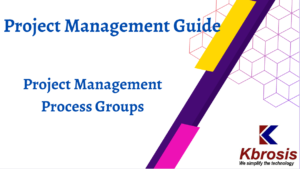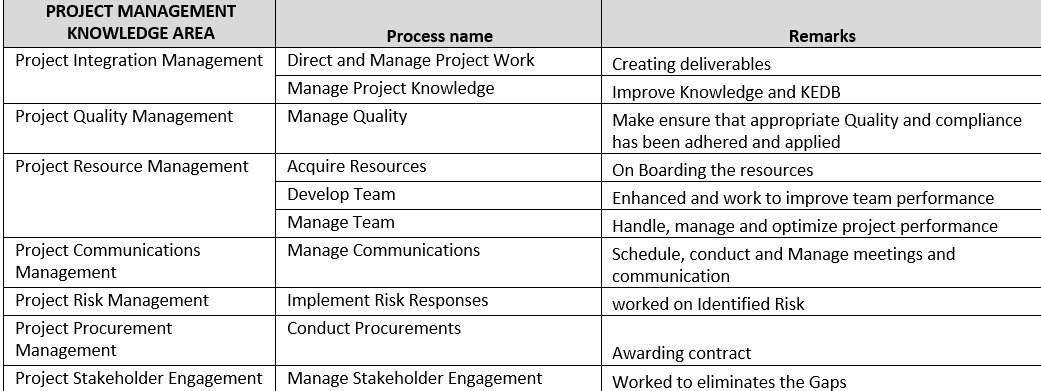There are 5 Project Management Process Groups which cover the entire project lifecycle. In our previous blog, we discussed about Project lifecycle which is help us to understand what need to do to do the work, whereas in project management process we will understand what you need to do to manage the project.
Project Management is not small task, and it has a define timeline to start and complete, it cannot be a continuous process. To make ensure that project should be start on time and will be finish on time with quality, then we have to follow some management process which help us to manage, monitoring, execute, track and mitigate any risk to complete the project successfully.

Project Management Knowledge Areas & Processes

As per per PMBOK 6th Edition (PMP Exam), There are 10 project management knowledge areas which cover each of the 49 project management processes.
- 5 Process Group
- 10 Knowledge Area
- 49 project management processes
5 x Process Group:
- Initiating,
- Planning,
- Execution,
- Monitoring & Controlling
- Closing

10 x Knowledge Areas:
- Project Integration Management,
- Project Scope Management,
- Project Schedule Management,
- Project Cost Management,
- Project Quality Management,
- Project Resource Management,
- Project Communications Management,
- Project Risk Management,
- Project Procurement Management,
- Project Stakeholder Management

49 x project management processes:
All these 49 Project management processes are divided between Process and Knowledge areas.

(Reference: PMP PMBOOK by PMI)
Process Groups
Those process groups typically are following:
- Initiating (Start)
- Planning (Plan)
- Executing (Do)
- Monitoring & controlling (Check & act)
- Closing (Close)
-
Initiating:
This is the phase when a project is on ground and formally announced to execute. This process covers all the requirement, SOW, design and timelines. To initiate the project Charter is the first document which is required. Initiating a project is not a easy task, you have to prepare it fully with good research, clear understanding of SOW and client requirement.
To initiate a new project majorly two processes are mandatory or necessary: Preparing a Project Charter and identifying the stakeholders.
Project Charter:
A project charter contains an overview of the project. Project Charter included below documents / information.
Project charter is a document including high level information of the project: project background, business case, goals (S.M.A.R.T. specific, measurable, attainable, realistic, time-bound), who is and the authority of the project manager, budget, risk, stakeholders, deliverables, approval criteria, etc.
- Business case
- Scope and deliverables
- Objectives
- Resources required.
- Milestone plan and timeline
- Cost estimate
- Risks and issues
- Dependencies
- Identify the Project Sponsors and project manager.
Identifying Stakeholders: Stakeholders are the key requirement of the project. If you have perfect team then your project will be completed successfully without any issue, for that you should know about the capabilities of all stakeholders. We can maintain Stakeholder Registers as well where we can maintain the stakeholder information.
What is Project Stakeholder
Stakeholders include all members of the project team as well as all interested entities that are internal or external to the organization.
Sponsor: A sponsor is the person or group who provides resources and support for the project and is accountable for enabling success.
Customers and users: Customers are the persons or organizations who will approve and manage the project’s product, service, or result. Users are the persons or organizations who will use the project’s product, service, or result.
Sellers: Sellers, also called vendors, suppliers, or contractors, are external companies that enter into a contractual agreement to provide components or services necessary for the project.
Business partners: Business partners are external organizations that have a special relationship with the enterprise, sometimes attained through a certification process. Business partners provide specialized expertise or fill a specified role such as installation, customization, training, or support.
-
Planning:
Planning is the second process after project is initiated. The main purpose is to plan time, cost and resources effectively to estimate the work required and to manage risk effectively during project execution. All this information is recorded in the project management plan. Project Plan is the document which shows the actual face of project with efforts and timeline. Also planning multiple processes and knowledge area includes:

There is 10 PROJECT MANAGEMENT KNOWLEDGE AREA applicable in Planning phase which covers 24 Processes to for Project Planning before go to next phase.
- Project Integration management
- Project Scope Management
- Project Schedule Management
- Project Cost Management
- Project Quality Management
- Project Resource Management
- Project Communications Management
- Project Risk Management
- Project Procurement Management
- Project Stakeholder Management
Let’s discuss each one of that process under their knowledge areas.
- Project Integration management

- Project Scope Management

- Project Schedule Management

- Project Cost Management

- Project Quality Management

- Project Resource Management

- Project Communications Management

- Project Risk Management

- Project Procurement Management

- Project Stakeholder Management

2. Executing:
After Planning its time to execute and place the project on ground. Execution is the process when we start implementing the project as per agreed contract and Project plan.

3. Monitoring and Controlling:
Every project needs control, and someone needs to monitor from Eagle’s Eye, so that project should be under control in respect to Cost, time, Resource and SOW. Project manager needs to keep monitoring as every step and track the project as per project plan including:
- where are we against where we should be?
- Time, Cost, effort, scope, Resource.
- Identifying Risk and corrective actions to address risks and issues.
- Managing changes (Change management)

4. Closing:
Closing a project means finishing all activities across all process groups, handed over to client and officially announce the completion of project successfully as per required SOW with Desire results.
Project Control
It is part of project which is start early stage of project and end late in project as it requires to monitor post implementation review and feedbacks as well. Project Control is a process which keeps project on track, on-time and within budget. Project control should not be too much otherwise it could be time consuming and also it should not be too little as it could be Risky.
(Reference: PMP PMBOOK by PMI)
Read More : https://techblog.kbrosistechnologies.com/
Visit to our site : https://www.kbrosistechnologies.com/
Watch more Video https://www.youtube.com/channel/UCpcd6IshE1caAbf9EdJd3gw

